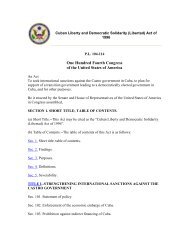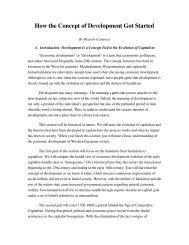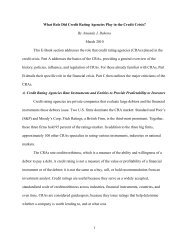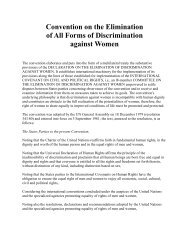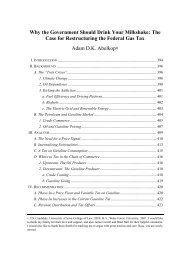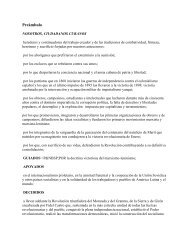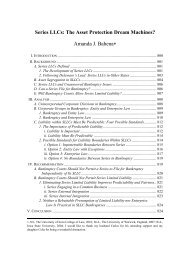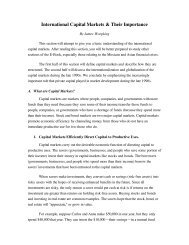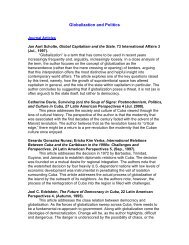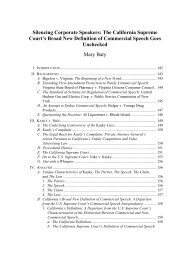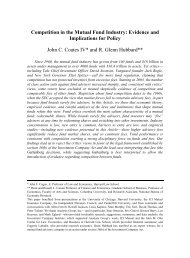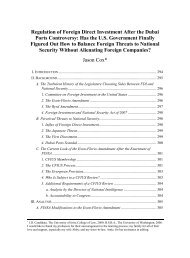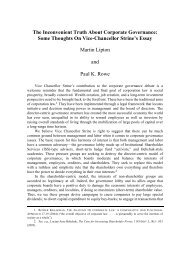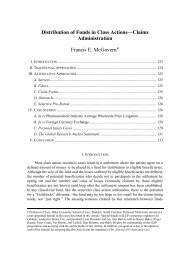Galactic Stupidity and the Business Judgment Rule - College of Law
Galactic Stupidity and the Business Judgment Rule - College of Law
Galactic Stupidity and the Business Judgment Rule - College of Law
You also want an ePaper? Increase the reach of your titles
YUMPU automatically turns print PDFs into web optimized ePapers that Google loves.
2007] <strong>Galactic</strong> <strong>Stupidity</strong> 313<br />
that way. 67 While most corporate lawyers hesitate to use this kind <strong>of</strong> language, it is<br />
<strong>of</strong>tentimes reasonable for a corporate director to make a decision—even one that an<br />
impartial observer might call rash or risky—that is unlikely to benefit <strong>the</strong> shareholders <strong>of</strong><br />
<strong>the</strong> corporation because corporate decision making requires taking risks. 68 It is even<br />
reasonable for a corporate director to make a decision that turns out to harm his company<br />
<strong>and</strong> that a judge might later find puzzling or misguided. We want directors to make <strong>the</strong>se<br />
kinds <strong>of</strong> decisions because <strong>of</strong>ten enough <strong>the</strong>y turn out to enrich <strong>the</strong> shareholders. Indeed,<br />
<strong>the</strong> law allows a great deal <strong>of</strong> discretion for directors to take such risks—as long as <strong>the</strong>y<br />
act rationally <strong>and</strong> in good faith. Although few commentators are willing to say so<br />
explicitly, <strong>the</strong> law seems to be saying that a rational director is simply one who has made<br />
a decision that a reasonable director might also have made. In tort law, we ask what a<br />
reasonable person would have done under <strong>the</strong> circumstances. Perhaps, <strong>the</strong> business<br />
judgment rule is really simply asking what decision would a reasonable director have<br />
made under <strong>the</strong> circumstances, implicitly acknowledging that <strong>the</strong> circumstances <strong>of</strong> a<br />
corporation call for very different st<strong>and</strong>ards <strong>of</strong> risk taking, uncertainty, <strong>and</strong> tolerance for<br />
failure.<br />
As Allen et al. acknowledge, it is very difficult to come up with a meaningful<br />
distinction between <strong>the</strong> st<strong>and</strong>ards <strong>of</strong> “reasonable” <strong>and</strong> “rational” as <strong>the</strong>y apply to<br />
corporate directors. 69 It is perhaps impossible, because a rational director is one who<br />
makes only decisions that he believes to be reasonable. After all, it would not be rational<br />
for a director to make a decision that he believes does not rise to <strong>the</strong> level <strong>of</strong> what a<br />
reasonable director would do. 70 If <strong>the</strong> director knew that his decision was unreasonable,<br />
<strong>the</strong>n surely his action would constitute irrationality or bad faith. If <strong>the</strong> director did not<br />
know that his decision was unreasonable, <strong>the</strong>n he himself is, by definition, an<br />
unreasonable director, <strong>and</strong> he has come very close to <strong>the</strong> kind <strong>of</strong> irrationality that is not<br />
protected by <strong>the</strong> business judgment rule. Fur<strong>the</strong>r, if <strong>the</strong> director’s decision is objectively<br />
reasonable, it does not matter whe<strong>the</strong>r he employed a rational procedure to arrive at that<br />
decision.<br />
But <strong>the</strong> st<strong>and</strong>ard for culpability for a breach <strong>of</strong> <strong>the</strong> duty <strong>of</strong> care by a corporate<br />
director is not merely negligence (by reviewing <strong>the</strong> reasonableness <strong>of</strong> <strong>the</strong> director’s<br />
actions), but ra<strong>the</strong>r gross negligence, which, in <strong>the</strong> corporate context, means “reckless<br />
indifference to or a deliberate disregard <strong>of</strong> <strong>the</strong> whole body <strong>of</strong> stockholders or actions<br />
67. Allen et al. put it nicely: “[b]ecause <strong>the</strong> expected value <strong>of</strong> a risky business decision may be greater<br />
than that <strong>of</strong> a less risky decision, directors may be acting in <strong>the</strong> best interest <strong>of</strong> <strong>the</strong> shareholders when <strong>the</strong>y<br />
choose <strong>the</strong> riskier alternative.” Id. at 455. For a discussion <strong>of</strong> how <strong>the</strong> law can encourage risk-taking in o<strong>the</strong>r<br />
kinds <strong>of</strong> business organizations, see David Rosenberg, Venture Capital Limited Partnerships: A Study in<br />
Freedom <strong>of</strong> Contract, 2002 COLUM. BUS. L. REV. 363 (2002).<br />
68. Again, this is in contrast to automobile driving in which <strong>the</strong>re will always be liability for calculated<br />
risks that turn out badly. Perhaps my use <strong>of</strong> <strong>the</strong> term “calculated” begs <strong>the</strong> question. We expect directors to take<br />
risks based on <strong>the</strong>ir knowledge <strong>of</strong> <strong>the</strong> extent <strong>of</strong> <strong>the</strong> risk. But if no calculation is made <strong>and</strong> <strong>the</strong> decision turns out<br />
badly, that might very well constitute bad faith on <strong>the</strong> part <strong>of</strong> <strong>the</strong> director.<br />
69. They explain: “Admittedly, <strong>the</strong> distinction between ‘reasonable’ <strong>and</strong> ‘rational’ actions is <strong>of</strong>ten subtle<br />
<strong>and</strong> elusive to grasp. Linguistically, it is odd to think <strong>of</strong> a board decision as unreasonable yet ‘rational,’ since<br />
both concepts rest in great part on whe<strong>the</strong>r <strong>the</strong> conduct was logical in <strong>the</strong> circumstances.” Allen et al., supra<br />
note 57, at 452 n.13.<br />
70. For a similar argument regarding <strong>the</strong> definition <strong>of</strong> good faith under section 102(b)(7), see Rosenberg,<br />
supra note 5.



